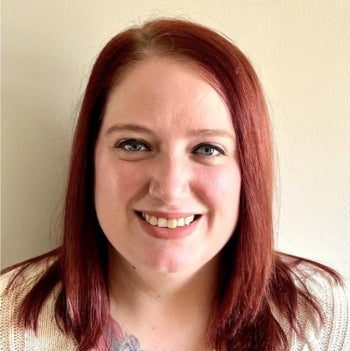Editor’s note: This story is part of a series of profiles of notable fall 2024 graduates.
There’s no question that Summer Rostad’s journey through higher education has been one of resilience. Enrolling in college right out of high school, the Carlisle, Pennsylvania, resident struggled with mental health and the sudden loss of her mother, hardships that disrupted her studies and left her questioning her future direction.
Despite these obstacles, Rostad’s desire to finish her education, driven by a deep curiosity about the causes of human behavior and societal structures, persisted. The COVID-19 pandemic in 2020 sparked a new sense of urgency.
“2020 made me realize that life can change in an instant, and I found myself wanting to finish my education,” she says.
Rostad found her ticket back to school through ASU’s Earned Admission pathway, which allowed her to prove herself academically and opened the door to the T. Denny Sanford School of Social and Family Dynamics' sociology program via ASU Online.
“For as long as I can remember, I’ve always wanted to know the ‘why’ behind things — especially the ‘why’ behind certain social constructs and expectations,” Rostad says. “Upon researching majors, I stumbled onto sociology and realized it was perfect for my drive to understand people, society, and the connections and influences between the two.”
Now Rostad is graduating with a perfect GPA and academic recognition.
“I’m incredibly grateful to ASU for giving me the opportunity to prove myself instead of seeing me as just another GPA … which is now 4.0, and I will be graduating with honors!” she says.
Her experiences, combined with her education in sociology, have deepened her understanding of societal issues and fueled a drive to advocate for underserved populations. Currently established in a role at a major health insurance company, she’s eager to apply her sociological knowledge to inspire positive change in her organization. Additionally, she’s channeling her passion into a research project and book focused on the sociological aspects of serial offenders.
We reached out to Rostad to hear more about her journey, the professors who made an impact and her advice for those facing their own hurdles.
Question: What’s something you learned while at ASU — in the classroom or otherwise — that surprised you or changed your perspective?
Answer: In many of the classes I have taken, the importance of cultural competency has been stressed. While I have always maintained an open mind, I can’t say I was well-versed in how to communicate or understand those from cultures different from my own. Now, I feel confident that I can communicate across cultures and understand other cultures/their beliefs in a way I couldn’t before.
Q: Which professor taught you the most important lesson while at ASU?
A: I took two classes by Professor Kari Visconti and found her to be one of the kindest, most interesting, most engaging professors that I had. One of my biggest takeaways from her classes was not only the importance of appropriate research methodology, but also the importance of personal biases and how these can affect many aspects of how you look at and engage with society and others in society.
Q: What’s the best piece of advice you’d give to those still in school?
A: Never give up on yourself. Even if it feels like everyone else has given up on you, always believe in yourself and your abilities.
Q: What are your plans after graduation?
A: I currently work for a large health insurance company here in Pennsylvania, and my company does amazing work with and for our community. Even if I don’t apply my degree to my career just yet, I’m confident that the skills, knowledge and experience I’m leaving ASU with will make me an asset to helping better our community and the populations of people who reside here.
Q: If someone gave you $40 million to solve one problem on our planet, what would you tackle?
A: I’m going to cheat and give two things in one — but homelessness and food insecurity, which often go hand in hand. Those who are the most in need are often vilified in society, and I feel as if it is my life purpose to stand up for those who don’t have many people, if at all, standing in their corner.
More Sun Devil community

Supporters show their generosity during Sun Devil Giving Day 2025
Thousands of Arizona State University supporters from across the globe came together on Sun Devil Giving Day on March 20 to give to scholarships, research, student programs and university initiatives…

New ASU women's basketball coach has sights set on championships
Molly Miller apologized for being a few minutes late for her Zoom interview Sunday afternoon.No apology was necessary.It’s been a crazy and hectic 72 hours for Miller, who guided Grand Canyon…
SolarSPELL wins 'best in show' award at South by Southwest
Arizona State University professors from a variety of disciplines made a big splash at the South by Southwest festival of technology and culture in Texas earlier this month.The ASU SolarSPELL…


